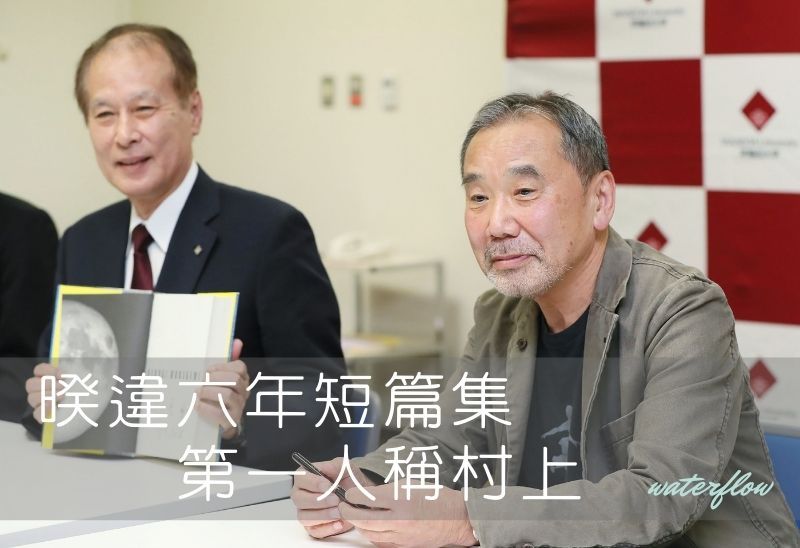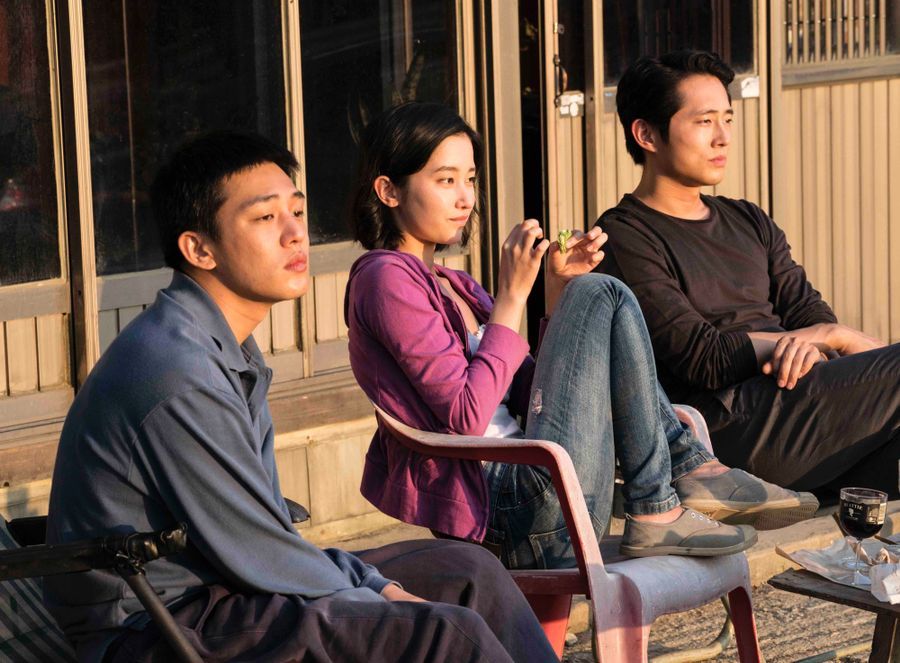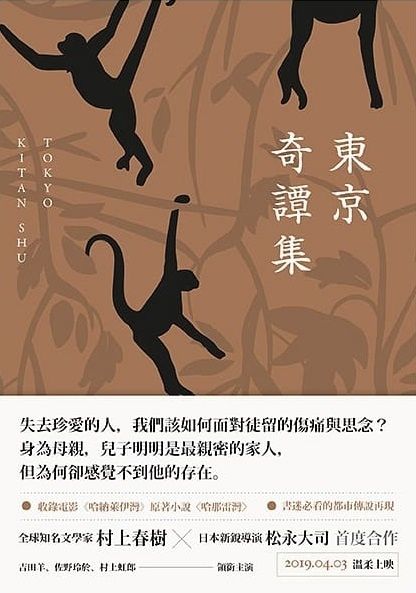[Literature] Murakami in the first person of the six-year short story collection

Following last year's "Abandoned Cat: What I Want to Say About My Father", the famous Japanese novelist Haruki Murakami has published a new book. "First Person Singular" is a collection of short stories written by Uncle Murakami for six years. The Chinese translation was published by the Taiwan Times. Launched last month, it contains eight short stories. I believe that many readers, like me, are reading Haruki Murakami's words to celebrate the Lunar New Year.

Short stories are also worth watching
Haruki Murakami's novels such as "Norwegian Forest", "The End of the World and a Cold World", and "1Q84" are blockbuster works, but Murakami's short stories and even ultra-short stories are really not to be missed, because some of his works are similar to his famous novels. , written the same or even better. For example, the short titled "Meet 100% Girls on a Sunny Morning in April" is one of Murakami's most famous works; last year's Chinese translation of "Abandoned Cats: About Fathers" , What I Want to Say" is also good-looking; "Norwegian Forest" is rewritten based on the short story "Firefly"; there are also movies adapted from Murakami's short stories, such as "Tony Valley", "Burning Lost Paradise" (The original story was titled "Burning the Woodhouse") and so on. There are also many short stories written by Murakami, such as "Sleep", "The Assault on the Bakery", "The Story of the Library", etc., with illustrations and exquisite prints, which are worthy of readers' collection.
Although there is no official word count, compared with Murakami's short stories in the past, the units of "First Person Singular" seem to be shorter, mostly two or thirty pages, and the longest "Walking with the Beatles" is only five. It’s just over ten pages, and each page has wider fonts and sparse line spacing, just like it’s specially designed for older readers with presbyopia (a lot of offense!), and it’s also easy to read and can always be done in one go.
As the name suggests, each paragraph of the book takes the "first person" or "I" as the protagonist, and the reader wanders through the point of view of "I", contemplating the object the author wants to describe and the emotional world. It is described as a "compound eye novel" in the propaganda, and it is also interesting. In fact, it means that many "Is" see the world.
When it comes to the title of the book, attentive readers who are full of world literature will notice that one of British writer Maugham's short story collection is titled "Six Stories Written in the First Person Singular", and Murakami misappropriated the name in the work Famous disks are commonplace. For example, "1Q84", which is written in three heavy volumes, is George. Homonym of Orwell's classic "1984" (the Japanese "nine" and "Q" are similar in pronunciation); the last volume of short stories, "Men Without Women", is obviously based on Hemingway's short story collection "Men Without Women" . This time, "First-Person Singular" will also be cooked as a bowl to compare the literary-style counter-reading.

Meet Shinagawa Monkey Again
The author explained eight stories in "First-Person Singular", and Murakami fans along the way would have focused their attention on "Confessions of Shinagawa Monkeys" first. "Confessions of a Monkey in Shinagawa" is not a human being, but a human-speaking animal who was raised by a physics professor, likes to listen to Bruckner, works in a hotel, and even wipes "me"'s back while soaking in hot springs. The monkey who drank beer and talked with "me" that night! This strange monkey made its debut in "Shinagawa Monkey" in "Tokyo Chi Tan Ji", and when it was caught in the story, it confessed that he had a "disease", that is, he couldn't control himself to steal the "love" of the person he admired. famous brand". The brand name is just a sign. When this monkey with incredible ability stole the "brand name", he also stole a "small piece" of his "name", so the other party would accidentally forget his own name (but around him). People will not forget her name), it even said in its defense: "I am indeed stealing people's names, but at the same time, I also take away some of the negative elements attached to the name." It's amazing.
Enough "Qi Tan", right? So the story of "Shinagawa Monkey" and the vivid image of Shinagawa Monkey have always stayed in my heart, and I will never forget it. Monkey is in front of "I", and it is straightforward to admit the abnormal behavior of stealing a loved one's brand name, which makes readers understand it more deeply. The process of stealing the "name" is that it uses mind power/spiritual energy to stare at the tangible things that record the person's name for a long time, such as ID cards, student ID cards, passports, etc., to achieve "the name of the crush. Take it into my consciousness as it is", "a part of her becomes a part of me" purpose. Of course, even though "Confessions of a Monkey in Shinagawa" has made more detailed descriptions, the incredible things are still incredible. After reading it, readers may not have the solidity of "Oh, so it is", but the surprise of "It turned out to be so".
From "Shinagawa Monkey" to "Confessions of Shinagawa Monkey", readers may be able to observe Haruki Murakami's writing techniques and intentions in recent years. "Shinagawa Monkey" has a fairly complete beginnings and transitions, and even lays out the layout of mystery novels, which is more story-like and dramatic. "Confessions of the Shinagawa Monkey" is not the case. It is the first experience of "I". Through a question and answer (although the last paragraph of "The Shinagawa Monkey" also has similar brushstrokes), the description and thoughts of the Shinagawa monkey are more subjective ( "I want to affirm the distressing honesty of the monkey's confession," "extreme love, extreme loneliness"), a bit like Murakami rereading and re-examining his old works. Readers can also see his changes and changes.

The sense of 'I' face-to-face
Except for "Confessions of a Monkey in Shinagawa", other stories in "First-Person Singular" have a sense of confrontation and sharpness, and their short length may also bring effects. "Stone Pillow" has elements of tanka that are rarely seen in Murakami's works, highlighting the poetry and sadness of love and death. "Walking With The Beatles" has the plot of "Meeting 100% of the Girls on a Sunny Morning in April". In the story, the ex-girlfriend commits suicide, and there is a shadow of works such as "Norwegian Forest". The layout can also be read in parallel with "Stone Pillow".
"Meat Sacrifice" is also an excellent work. The author's depiction of the "Ugly Girl" (although he did not draw it in line), as well as the turning point of the story, all make readers fall into deep emotions, and the text's reckless expressiveness of classical music makes the readers fall into deep emotions. I think of Kazuo Ishiguro's collection of short stories "Nocturne", which must be more resonant for classical music fans who like Schumann's "Carnaval". In addition to "The Feast of the Meat", music lovers may also have feelings for "Charlie Parker Plays Bossa Nova", a surreal story about "I" when I was young and fictional jazz celebrity Charlie Parker recorded a video titled "Charlie Parker Plays Bossa Nova" album, even more eloquently wrote a fake music review, when I grew up I saw this "record" in a New York record store, and later made a Charlie Parker only for him to play that one Dream of the first track "Corovado" on side A of the fictional album! The author is in this story, the author is in this story, and the themes of death, rebirth, and creativity are well written.
"A Collection of Yakult Swallow Poems" is an autobiographical essay by Haruki Murakami, which also mentions his father. Readers can take it as an extension of "Abandoned Cat: What I Want to Say About My Father", which also includes Murakami Whether or not the "poetry" written by Haruki when he was young is interesting (laughs), it is also rare to see. The theme is "First Person Singular", which more directly throws the theme of "I" to readers - don't forget, the theme of "Shinagawa Monkey" is very prominent at all, and Murakami found it to rewrite "I" The reason for "The Confession of Shinagawa Monkey".
"First-Person Singular" emphasizes starting from "I", and through "I", the protagonist, Murakami looks at the world, and tells everything about the world. He is an author over seventy years old. A writing that can be seen and broken.
(Original published in the supplement of Sing Tao Daily on February 18, 2021)

Like my work? Don't forget to support and clap, let me know that you are with me on the road of creation. Keep this enthusiasm together!

- Author
- More